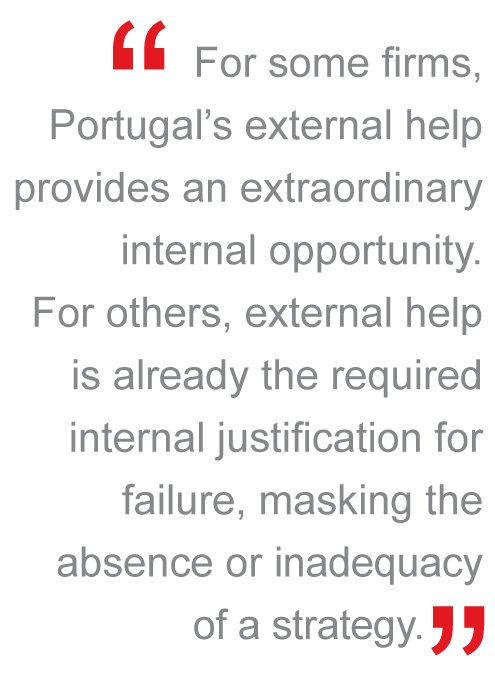External financial assistance will increase internal market stratification
Portugal’s request for outside financial assistance presents an ultimate test of the country’s law firms’ strategies, says Pedro Cardigos
What we have long feared, predicted or expected has finally happened. Portugal has requested and will obtain substantial financial assistance from the EU and IMF. In my opinion, this will have a major impact on the legal market, especially those firms focused on corporate finance, financial services and taxation.
Para Pedro Cardigos, Socio Director de Cardigos, la solicitud de ayuda económica externa por parte de Portugal representa una prueba “de fuego” en cuanto a las estrategias de los despachos . Los mismos tendrán que hacer un esfuerzo por comprender el impacto que el rescate tendrá en los negocios y operaciones de las empresas, especialmente en el sector de los servicios financieros y en las transacciones nacionales e internacionales.
The first major impact will of course be on firms’ clients.The next four years will see the reshaping of the profile of entities requiring legal services, particularly of clients with sophisticated needs.
From the current widespread squeeze on credit – which raised obstacles and/or halted investment plans previously in the pipeline – we will experience the loosening of credit lines, but still with tight conditions and requiring heavier collateral ratios. The financial market will focus towards high margin sectors, with significant internal market quotas and, more importantly, exporting capacities.
Those clients with securities portfolios with guaranteed capability and which have a strong desire for efficiency-driven tax structures, (decisive in a tighter tax environment) will be the most prized.
As regards the provision of financial services, this will follow a similar trend. I expect clear opportunities for structures with lower leverage, grounded on collateral mechanisms, “ring-fenced” or statutorily exempt from insolvency ”clawbacks” and distinctively tax “engineered”. In addition, uncertain times will lead to increased risk assessment and clients’ urge to mitigate them – including risk variations on interest or exchange rates, production costs, commodities or inflation – hence, the increase of the current already high level of hedging-related transactions using futures exchanges or, particularly, OTC markets.
Finally, law firms’ geography will also be important. It will be crucial to “map” the strategic moves of target clients, anticipating divestments in Brazil, the strengthening of positions in Poland, the uncertainties of Angola, the postponed future of Mozambique and now the uncertainties of the Maghreb region.
 There are a significant number of Portuguese companies that operate internationally and have a say in the current and future trade routes. The challenge to law firms that desire to “tap” this geographic opportunity is to be strategically aligned with their clients and to invest alongside them to avoid local competition. Occasional follow-ups, shifting alliances and ever-changing associations carved on personal projects or on marketing coups will, more than ever, be a waste of resources. The few law firms that have strategically and timely invested are already now reaping the benefit of their boldness and vision, supported by a solid sourcing interface, which in itself mitigates the geo-political changes, and dilutes crises such as our own, and those of Ireland and Greece.
There are a significant number of Portuguese companies that operate internationally and have a say in the current and future trade routes. The challenge to law firms that desire to “tap” this geographic opportunity is to be strategically aligned with their clients and to invest alongside them to avoid local competition. Occasional follow-ups, shifting alliances and ever-changing associations carved on personal projects or on marketing coups will, more than ever, be a waste of resources. The few law firms that have strategically and timely invested are already now reaping the benefit of their boldness and vision, supported by a solid sourcing interface, which in itself mitigates the geo-political changes, and dilutes crises such as our own, and those of Ireland and Greece.
That said, I believe that it would be wrong to redesign a law firm’s strategy as a result of the strong and uncertain winds of change such as those we are now experiencing. However the error margins are now minimal, and strategy tests – based on clients, services or geography – are increasing. I firmly believe that the crisis, as long and hard as it is, will favour those enlightened law firm strategies, providing the ultimate test of the excellence (and resilience) of its management and setting the benchmark for the fittest and most adaptable.
I am indeed convinced that Portugal’s external help will result in effective and productive internal assistance, allowing a clearer stratification of the most capable economic, financial and industrial players. But it will also test the relevance of legal services to address clients’ needs, encouraging focused creativity as never before; and the relevance of law firms’ strategies to effectively and consistently add value including in markets far away from Portugal and its crisis.
Strategic awareness and anticipation is, in my opinion, why during 2010 a number of firms achieved record revenues while others may not survive 2011 and certainly not 2012. For some firms, Portugal’s external help provides an extraordinary internal opportunity. For others, external help is already the required internal justification for failure, masking the absence or inadequacy of a strategy.
Pedro Cardigos is a corporate and finance specialist and the co-founder and Principal of the Lisbon-based law firm Cardigos. He was previously President of the Portuguese Association of Law Firms (ASAP). He can be reached via pcardigos@cardigos.com.
Subscribe now to receive your copy of Iberian Lawyer











